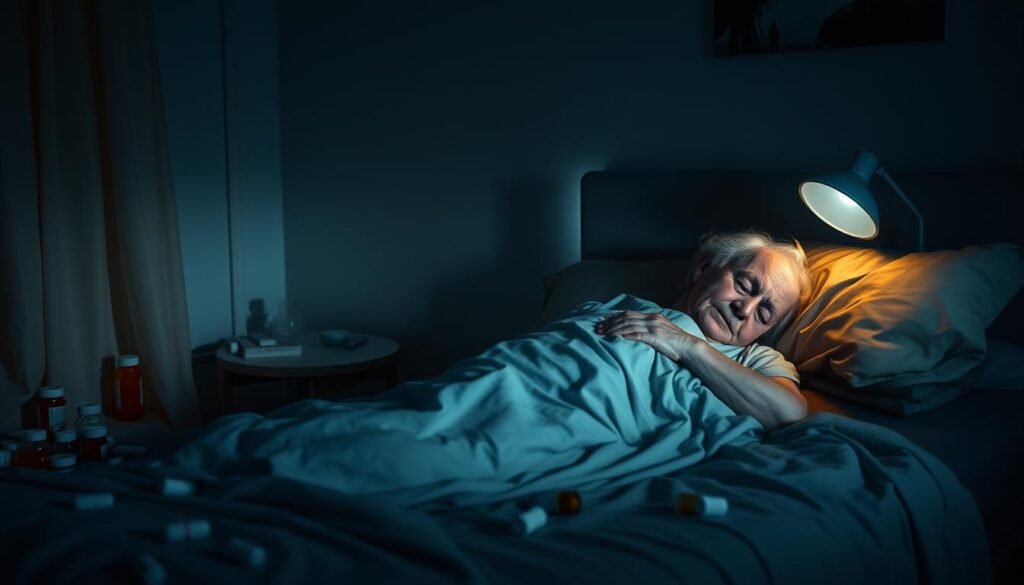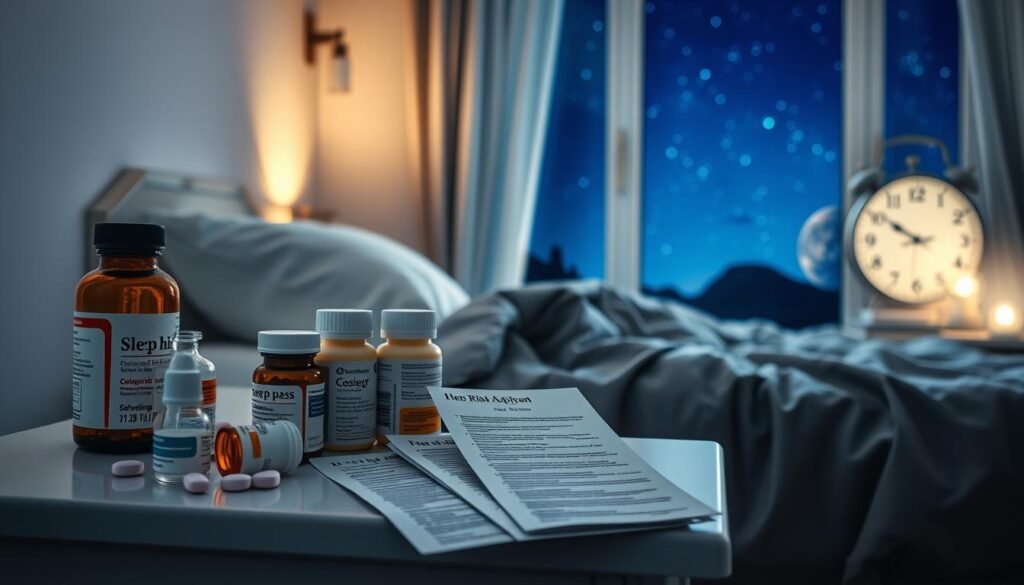About 1 in 3 people may face insomnia at some stage in their lives. This becomes more likely as someone gets older. With more seniors than ever, it’s vital to understand sleep medication’s risks and side effects. Many turn to sleeping pills when other treatments don’t help. They seek relief from things like pain, menopause symptoms, and needing the bathroom at night. But, using sleep aids can lead to issues such as memory loss, drowsiness, and more severe risks like falls and confusion.
It’s important to think carefully about the downsides of sleep medications for the elderly. While these drugs might help in the short term, they could make problems worse over time. This piece highlights these issues. It aims to help caregivers and seniors make choices about sleep aids with safety and health in mind.
Key Takeaways
- 1 in 3 people will experience insomnia, often exacerbated in older adults.
- Sleeping pills bring various risks, particularly confusion and memory issues in seniors.
- Non-medicine treatments should be considered as first-line options for better sleep.
- Short-term relief from sleep medications can lead to long-term consequences.
- Dependency on sleep aids may create further challenges in managing insomnia.
- Evaluating individual health conditions is crucial prior to prescribing sleep medications.
- Alternative therapies like cognitive behavioral approaches can effectively enhance sleep quality.
Understanding Insomnia in Older Adults
Many older adults, about half, suffer from insomnia. As people age, this issue becomes more common. It’s important to know and tackle sleep issues in the elderly. Older people often struggle more to stay asleep. This leads to less sleep efficiency and shorter total sleep time compared to the young.
Risk factors for insomnia in seniors include many things like environment and health. Women are more at risk, especially after menopause. Conditions like arthritis and some medications can worsen sleep problems.
Stress can cause recurring insomnia in the elderly. Many report problems staying asleep, more so than starting to sleep.
Tools like the Pittsburgh Sleep Quality Index (PSQI) and Insomnia Severity Index (ISI) help measure sleep quality. A PSQI score above 5 means poor sleep. An ISI score over 14 points to serious insomnia. These tools help doctors create personalized treatment plans, improving sleep.
| Insomnia Symptoms | Prevalence Rate |
|---|---|
| Difficulty initiating sleep | 35% – 60% |
| Difficulty maintaining sleep | 50% – 70% |
| Nonrestorative sleep | 20% – 25% |
As the elderly population is set to double by 2050, it’s crucial to understand how to treat senior insomnia. Knowing these factors helps healthcare workers. They can make better plans to manage sleep issues in the elderly, improving their life quality.
Common Causes of Sleep Difficulties in Seniors
Sleep challenges in older adults come from many sources. These causes of insomnia in seniors need to be looked at closely. Most seniors should get 7 to 8 hours of sleep. But, getting this much sleep can be hard due to different factors.
Health issues like heart disease and Alzheimer’s can make sleep tough. Side effects from medicines can also mess with sleep, making it hard to fall asleep or wake up too early. Besides health problems, feeling stressed or anxious can make sleeping even harder.
Lifestyle choices also play a big part in how well seniors sleep. Exercising is good, but not right before bed. Eating a lot late at night or using phones or computers in bed can ruin sleep. Getting sunlight and sticking to a regular sleep routine helps a lot too.
The next table shows major factors affecting senior sleep:
| Factor | Impact on Sleep |
|---|---|
| Chronic Illness | Disrupts sleep due to discomfort and medical interventions. |
| Medications | Can cause side effects like restlessness or sedation. |
| Psychological Issues | Anxiety and depression can lead to sleeplessness. |
| Lifestyle Choices | Large meals, stimulants, and irregular schedules can hinder sleep. |
| Physical Activity | Regular exercise promotes better sleep; inactivity can worsen issues. |
Understanding these causes helps in tackling insomnia in seniors. It means medications and treatments are used wisely. By changing daily habits, seniors can enjoy better sleep health.
Risks and Side Effects of Sleep Medications in Seniors
Older adults often face trouble sleeping, so picking the right sleep aid is key. But these meds carry risks and side effects that can be tough for seniors. It’s important to know about these risks to keep them safe and well.
Potential Side Effects
Some common side effects from sleep meds are:
- Drowsiness
- Confusion
- Impaired motor skills
- Unusual dreams
- Increased risk of falls
Even small issues from sleep aids can lead to big problems like falls. Research shows a strong link between not sleeping well and getting hurt from a fall. Older people, especially, need to be careful since these meds can make thinking problems worse.
Short-term vs Long-term Use
Using sleep meds for a short time can help, but using them for too long isn’t good. Long-term use can cause dependency, make insomnia come back, and hurt thinking abilities. Doctors usually suggest not to depend on these meds for a long time, especially for seniors who already face more health risks.
To sum up, the dangers of sleep meds for seniors are serious. Making wise choices and checking regularly on how the meds are working is key to dealing with insomnia safely.
Types of Sleep Medications for Seniors
Knowing about sleep meds for older people is key. It helps understand their safety, benefits, and dangers. This info helps caregivers and seniors choose the best treatment. Sleep aids fall into categories like benzodiazepines, Z-drugs, and over-the-counter options.
Benzodiazepines
Temazepam and other benzodiazepines are common for treating senior insomnia. They’re good for starting sleep but can be risky. They might lead to dependency and brain issues.
It’s best to use these drugs short-term. Using them for a long time can cause problems. Seniors might fall more or get confused.
Z-Drugs
Zolpidem and Zopiclone are made to help you fall asleep. They may be better than older drugs due to fewer side effects. Yet, there are worries about their habit-forming potential.
Studies show Z-drugs have risks like older sleep aids. These include feeling sleepy or less sharp mentally the next day. This can make sleeping troubles for seniors worse.
Over-the-Counter Options
Over-the-counter sleep aids like diphenhydramine are widely used. They offer quick help for sleepless nights but bring problems like dry mouth and constipation. And you might wake up feeling confused.
Doctors should watch how these meds are used by seniors. They’re not right for everyone. Plus, they can add to the dangers of sleep drugs in the older population.
| Type of Sleep Medication | Examples | Efficacy | Risks |
|---|---|---|---|
| Benzodiazepines | Temazepam | Effective for sleep initiation | Cognitive impairment, dependency |
| Z-Drugs | Zolpidem, Zopiclone | Designed for sleep induction | Addiction, similar risks to benzodiazepines |
| Over-the-Counter Options | Diphenhydramine | Temporary relief | Next-day drowsiness, confusion |
Dependency and Withdrawal Challenges
The rise in addiction to sleep medications in seniors is causing significant problems. Many older adults become dependent on these drugs for sleep. They start to use them for insomnia but soon can’t sleep without them. This leads to withdrawal symptoms when they try to stop.
Stopping these sleep aids can lead to both body and mind symptoms. Anxiety, shaking, and worsening insomnia can begin within a day and peak after a few days. These symptoms impact sleep, daily activities, and mental health. It can cause people to feel a strong need to keep taking the medication.
To deal with withdrawal challenges, a careful plan is needed. Gradually reducing the medication can lessen symptoms. This helps people to slowly adjust to sleeping without drugs. It also encourages them to improve their sleep habits and lifestyle. A well-thought-out treatment plan is crucial to overcome withdrawal. It aims to improve life quality by tackling the addiction to sleep medications in seniors.
Adverse Events of Hypnotics in Geriatric Patients
The use of hypnotics in older people is a big worry. It can greatly affect their health. It’s key to know about these risks to make sleep better without harm.
Memory Loss and Confusion
Adverse events of hypnotics in geriatric patients are worrying. It leads to a lot more cognitive problems. Studies show these drugs make such issues nearly five times more likely than without them. This fact underlines the big risks of sleep aids for seniors. When we talk about memory loss and confusion, we look at how well they can think. This includes finding the right words, paying attention, and doing daily tasks. This is even tougher for those already dealing with health issues.
Increased Risk of Falls
The connection between sleep drugs and safety is scary. Not sleeping well is a risk for falling on its own. Studies show that this risk is 1.52 times higher when sleep is a problem. Thus, seniors on these drugs face an even bigger risk of falls. This fact shows how crucial it is to watch senior medication risks closely. Especially since these drugs might not even help much with sleep. We must look for safer ways and keep a close eye on geriatric care.

Prescribing Cautions for Senior Sleep Medications
When giving sleep meds to seniors, it’s important to be careful. Knowing a patient’s medical past is key to ensure their safety. Health problems, other meds, and how the person lives can influence treatment.
Assessing Patient History
It’s vital to know a patient’s history well. Older folks may not sleep well due to pain, anxiety, or night bathroom visits. It’s also critical to check how sleep aids might affect other conditions or meds.
Potential Drug Interactions
For seniors, drug mix-ups are a big worry. About half of older people struggle to sleep and take various prescriptions. It’s essential to understand how these meds mix, especially sleep aids.
Z-drugs like zolpidem bring risks, such as falls and confusion. Knowing these dangers helps doctors choose the best sleep med.
| Medication Type | Common Interactions | Risks |
|---|---|---|
| Z-drugs (e.g., Zolpidem, Zopiclone) | Antidepressants, Pain Medications | Increased risk of falls, Confusion |
| Benzodiazepines | Antibiotics, Antihistamines | Dizziness, Excessive sedation |
| Over-the-Counter Sleep Aids | Blood Pressure Medications | Increased risk of hypotension |
Alternative Treatments for Sleep Issues
Seniors who have trouble sleeping might find new hope in alternative treatments. Cognitive behavioral therapy for insomnia (CBT-I) is a standout option. It changes sleep-related thoughts and actions, helping to enhance sleep over time.
Cognitive Behavioral Therapy
Cognitive behavioral therapy for insomnia teaches useful ways to break free from bad sleep patterns. It helps seniors deal with anxiety, irregular sleep times, and poor sleep habits through customized sessions. Making these changes can greatly better their sleep quality.
Non-Pharmacological Approaches
Besides CBT-I, seniors have other drug-free treatment choices to explore. Here are a few:
- Mindfulness and Relaxation Techniques: Meditation and deep breathing help calm the mind for better sleep.
- Lifestyle Modifications: Staying active and keeping a regular sleep routine improve sleep quality.
- Light Therapy: Daily exposure to natural light keeps the internal clock in check.
- Dietary Adjustments: Eating less caffeine and avoiding big meals before bed can lead to better sleep.
Trying these strategies can offer seniors alternative ways to overcome sleep problems without medicine. These methods encourage healthier sleep habits and a higher quality of life.

Improving Sleep Hygiene in Seniors
To boost sleep hygiene in seniors, creating a peaceful sleep space is key. Making the bedroom cooler, quieter, and comfy helps sleep come easier.
Sticking to a regular sleep schedule helps a lot. Going to bed and waking up at the same time every day helps their internal clock. This makes falling asleep easier. Adding a calming nighttime routine, like reading or soft music, tells the body it’s time to rest.
Watching what they eat and drink matters too. Cutting back on caffeine and alcohol in the evening helps avoid sleep problems. Daily exercise like walking boosts mood and helps them sleep better at night.
Getting sunlight is important as well. Seniors should try to be in the sun for two hours a day. Sunlight helps keep their sleep patterns regular as they age.
Using these sleep tips can really improve seniors’ lives. By following these steps, they can face sleep issues better and enjoy life more.
| Sleep Hygiene Tip | Description |
|---|---|
| Regular Sleep Schedule | Go to bed and wake up at the same time daily to regulate the body’s clock. |
| Soothing Bedtime Routine | Engage in relaxing activities before bed, such as reading or listening to music. |
| Comfortable Sleeping Environment | Optimize room conditions including temperature, noise levels, and bedding comfort. |
| Dietary Management | Limit caffeine and alcohol, and ensure the last meal is several hours before bedtime. |
| Physical Activity | Engage in regular aerobic exercises to promote better sleep quality. |
| Sunlight Exposure | Get at least two hours of sunlight daily to support natural sleep cycles. |
Making Informed Decisions About Sleep Aids
It’s important to choose sleep aids carefully in today’s world. Talking to healthcare providers is key for managing sleep disorders well. Some people pick non-prescription sleep aids on their own, which can lead to problems. It’s best to talk to healthcare providers for safe and effective choices, considering one’s health.
Consulting Healthcare Providers
Talking to a healthcare provider is a must before starting any sleep aid. Only 16% of people asked experts about their sleep meds. Knowing the risks of mixing drugs and their side effects is critical. This is especially true for older adults, who often use these aids. The FDA checks prescription meds closely, but over-the-counter options carry risks too. Resources like Sleep Foundation offer good advice for making choices.
Monitoring Side Effects
Watching for side effects from sleep aids is crucial. But only 19% of folks read the warnings on their sleep meds. Staying informed helps you know how you’re reacting to the medication. Keeping in touch with healthcare providers helps tailor the medication to your needs. Older people should especially avoid mixing different sleep aids. Talking openly with professionals is important for handling sleep issues well.

| Statistic | Percentage |
|---|---|
| Participants self-recommending non-prescription sleep aids | 36% |
| Consulted healthcare professionals regarding sleep aid | 16% |
| Read medication dosage labels | 22% |
| Read side effects or warnings on sleep aids | 19% |
| Did not consult pharmacists about sleep problems | 65% |
| Older adults using antihistamine-containing OTC medications | 17% |
| American adults using sleep aid at least four times in the last week | 8.2% |
| Adults struggling to get enough sleep | More than 33% |
Understanding the Long-Term Impacts of Sleep Medication
Using sleep medications for a long time can really affect the health of older people. A 2018 study showed that using sleep aids often, especially ones like diphenhydramine and doxylamine succinate, could increase the chance of getting dementia 20 years later. These drugs also have side effects like feeling tired, having a dry mouth, and not seeing clearly.
It’s important for older adults to look closely at how sleep meds might affect them in the long run. Using certain antihistamines regularly isn’t recommended for seniors, especially if they have conditions like glaucoma or trouble urinating. Too much use can lead to problems with thinking and becoming too dependent on the drugs.
Looking into other ways to deal with sleep problems might be a good idea. Melatonin can help with sleep issues occasionally, but it might make you feel nauseous or sleepy during the day. Valerian root has been used for a long time as a sleep aid and is getting more popular, even though it can cause some mild side effects.
Taking sleeping pills a lot is something to be careful about. Studies show that older people who use sleep meds every night have a higher chance of falling and getting hurt. A study in 2020 highlighted that stopping these drugs suddenly can cause symptoms like feeling restless and anxious. Mixing sleep medication with alcohol or other sedatives is very risky and can cause breathing problems.
| Type of Sleep Aid | Potential Risks | Long-Term Effects |
|---|---|---|
| Diphenhydramine | Increased dementia risk, drowsiness, dry mouth | Cognitive decline, dependency |
| Melatonin | Nausea, headaches | Less data on long-term effects |
| Valerian | Headaches, mild weakness | Inconclusive long-term effects |
| Benzodiazepines | Dependency, cognitive impairment | Increased fall risk, long-term memory issues |
Understanding how sleep meds affect you over time is key for seniors who want to sleep well. Working with your healthcare team can help you manage sleep problems safely and effectively.
Conclusion
In summarizing the risks of sleep meds for the elderly, it’s key they and their caregivers know the side effects. These can include daytime sleepiness, trouble moving, and less focus. These issues may heavily affect daily life.
More serious problems like sleepwalking or addiction are possible too. These need quick action and could change lives.
Research shows up to 80% of people using sleep drugs for insomnia feel these effects later. This leads to problems at work and a worse life quality. It’s vital to talk to doctors about safer sleep options.
This could mean therapy or changing your lifestyle to better your sleep without meds. For more on treatment choices, checking out a detailed treatment plan is key.
Wrapping up, making a smart choice about sleep aids for the elderly is crucial. Knowing how sleep meds work and their impact on older adults is important. This knowledge helps find better ways to deal with sleep issues.
Talking to healthcare pros is a must for making wise decisions.